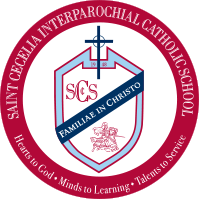The Pre-K classes integrate the Voluntary Pre-Kindergarten Curriculum, the Diocesan Standards and Benchmarks and the Florida Standards to provide students with many rich learning experiences throughout the school year. There is a focus on integration of skills and concepts across subject areas and settings.
Pre-K – 4 Year Old Class
PRE-K AT ST. CECELIA SCHOOL | 4-YEAR-OLD CLASS (VPK) CURRICULUM OVERVIEW
Spiritual Formation
Children are taught to know, remember, and apply the Word of God in their lives. Each day includes a time to share together in a special circle time while listening to and learning lessons from the Bible. The children learn what God’s word says and how to use the truths they discover to be more like Jesus. The curriculum is enhanced through the Gospel Weeklies provided by Pflaum Publishing. The classes collaborate for special weekly chapel lessons in preparation for all school Mass attendance beginning in September with their middle school buddies.
Language Arts
Reading, writing, listening, letter recognition, and oral language are the core of the language arts curriculum. Art projects, tactile materials and small motor manipulatives (hands-on activities) are available daily to develop and strengthen the fine motor skills necessary for writing. In addition, writing materials are available for the children’s use throughout the classroom. Students write and illustrate class books that become a cherished reading choice. Reading opportunities are available in the various centers, and through class made charts and labels located throughout the room. Children also visit the STREAM Center for a story time on a weekly basis. Students sing songs and read poems to further enhance the children’s exposure to language.
All aspects of the curriculum are related to the full development of a child, and as such, are cohesively intertwined through age appropriate PYP units of Inquiry. These include Friendships and Relationships, Change, Homes, and Communication. All units reflect our IB profile and our beautiful faith.
Mathematics
Exploration activities and work with manipulatives develop number sense, numeral recognition, counting, 1 to 1 correspondence, grouping, patterns, sorting, length, weight, classification, and shape recognition. This is accomplished through hands-on experiences with real materials. These materials include various types of building blocks, scales, and measuring tools. Whole group activities such as measuring and graphing help to further expose children to math concepts.
Science
The science curriculum is designed to allow for observation and exploration of materials both in the classroom and in the outdoor environment. Children are encouraged to ask questions, explore various materials, make predictions, and become more aware of the world around them. Through hands-on activities, inquiry based learning, engineering processes, and problem solving activities, children are exposed to the foundations of science. Students observe changes in the environment and changes in the seasons. Magnifying glasses, magnets, books, and water/sensory exploration tables are some of the instruments available for use in the classrooms.
Social Studies
As children grow, questions of “Who am I?” and “How do I fit into the world?” begin to arise. Through the exploration of occupations, cultures, likenesses and differences students are guided in exploring answers to these questions. Throughout the day, children are also learning the social skills necessary to function in society, and make sense of their world. The social studies curriculum is also implemented with age appropriate bullying prevention and conflict resolution experiences and integrated with Religion and Language.
Spanish
Instruction at this grade level is called “FLEX” (Foreign Language Experience or Exploratory). The main goal is to provide students with a foundation for foreign language study. This includes introducing basic sounds and phrases in order to sharpen listening skills and familiarize students with the notion of thoughts can be expressed in another language.
Visual Arts
Art activities are a daily part of the classroom. Through art, children are provided an avenue for self-expression while developing the fine motor skills necessary for writing. At the same time, children are exposed to math and science concepts. Each day, children have an opportunity to draw, paint and/or glue in the classrooms. The students visit with the art teacher once per week.
Physical Education
Large motor development is the focus of the physical education curriculum. Children have the opportunity to run, climb, balance, and jump daily during outdoor play and gym time to allow for maximum large muscle development. Non-competitive, cooperative group games are also played both outside and in the gym. Children at St. Cecelia School participate in Physical Education twice per week with the school’s P.E. teacher.
Performing Arts
Music and movement are woven into the daily class activities through songs, dance, rhythm instruments, and choral recitation. The class visits the Performing Arts room for activities with the Performing Arts teacher once per week.
Social Responsibility
St. Cecelia School helps children gain an understanding of themselves in relationship to others in their environment through buddies, classroom guests, celebrations, and charitable causes to which donations are made. Students participate in monthly class visits from the school counselor and safety director.
Social and Emotional Development
St. Cecelia School provides a safe and nurturing environment where children are respected and accepted for who they are; God’s children. The physical space of the classroom, as well as, a schedule incorporating flexible time block, give children the opportunity to:
- Engage in positive and appropriate peer interactions
- Gain an understanding of another person’s point of view
- Recognize and celebrate the differences and similarities among people
- Grow and develop at individual rates
- Transfer trust from adults in the home to those in a school setting

About Us
St. Cecelia Interparochial Catholic School (SCS) offers an academically challenging and globally minded interdisciplinary education to children in PreK-3 through 8th grade.
Contact Us
1350 Court Street
Clearwater, FL 33756
Phone: 727-461-1200
Fax: 727-446-9140
Admissions: 727-461-1207
Extended Day: 727-385-4851
(3:30-6:00pm)
Quick Links
© Copyright 2015 Saint Cecelia Interparochial Catholic School. Website designed and developed by BayshoreSolutions.

